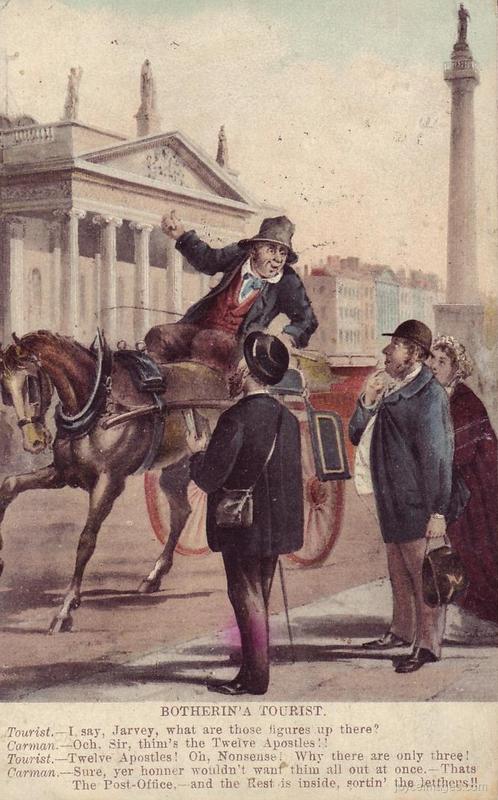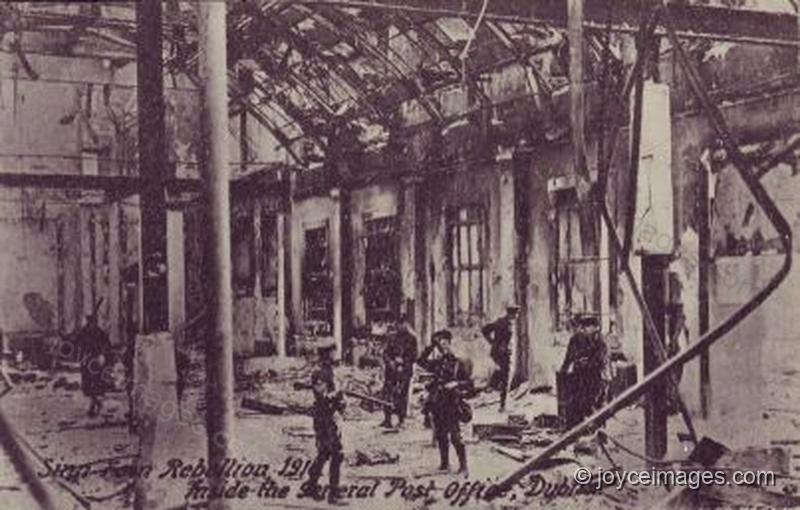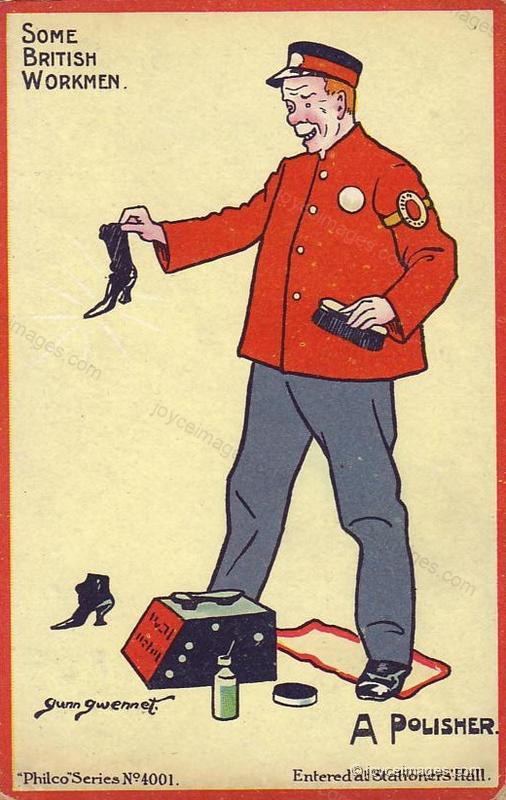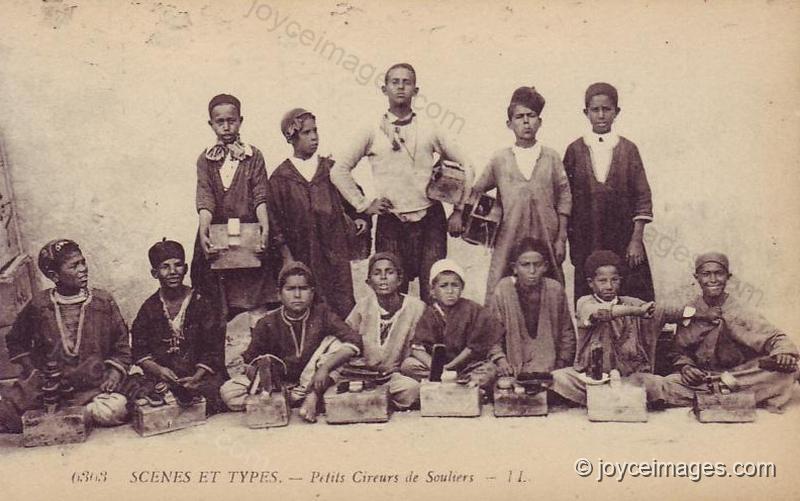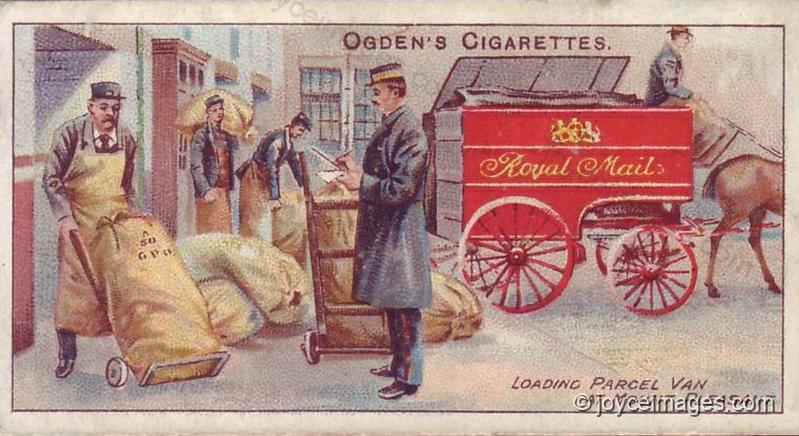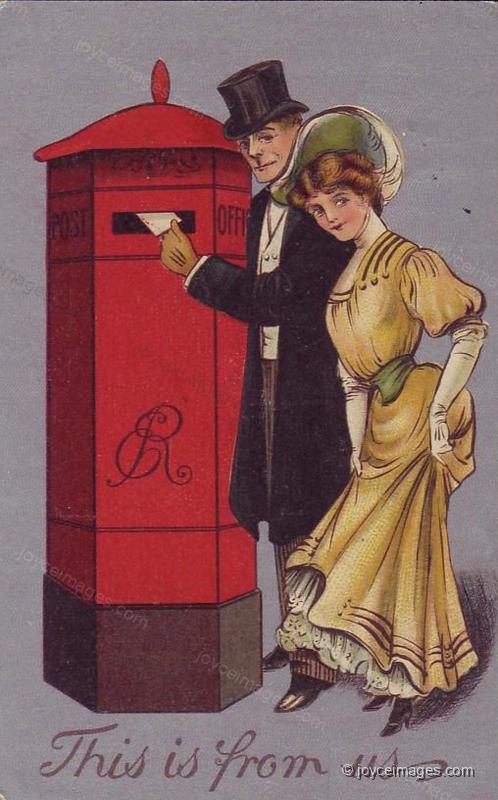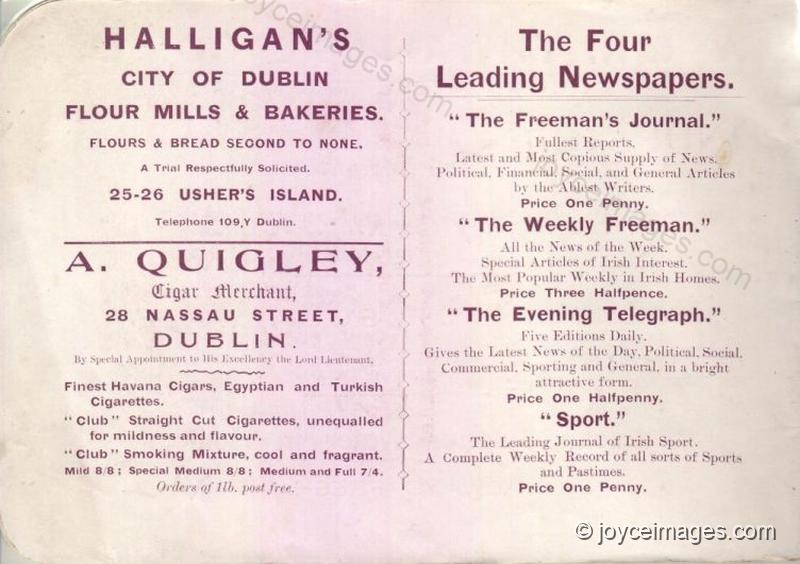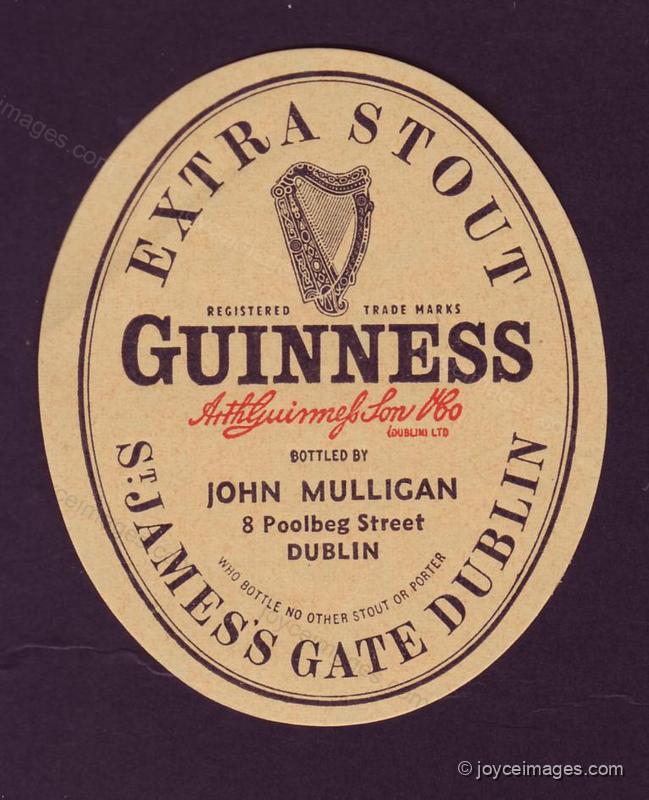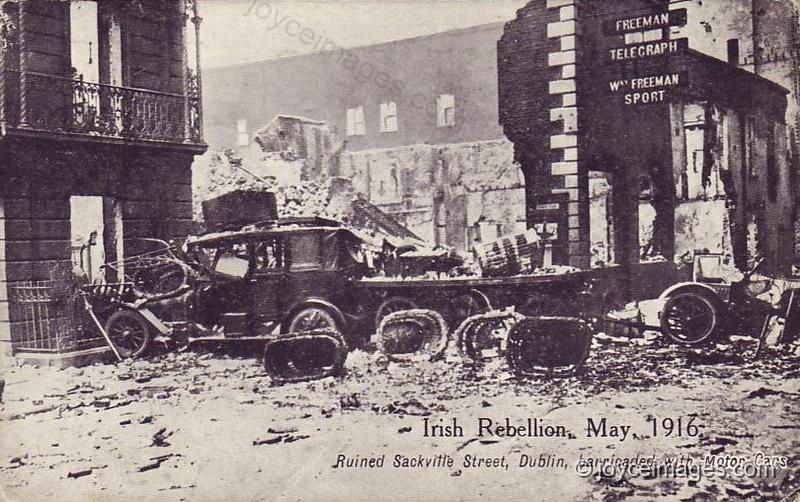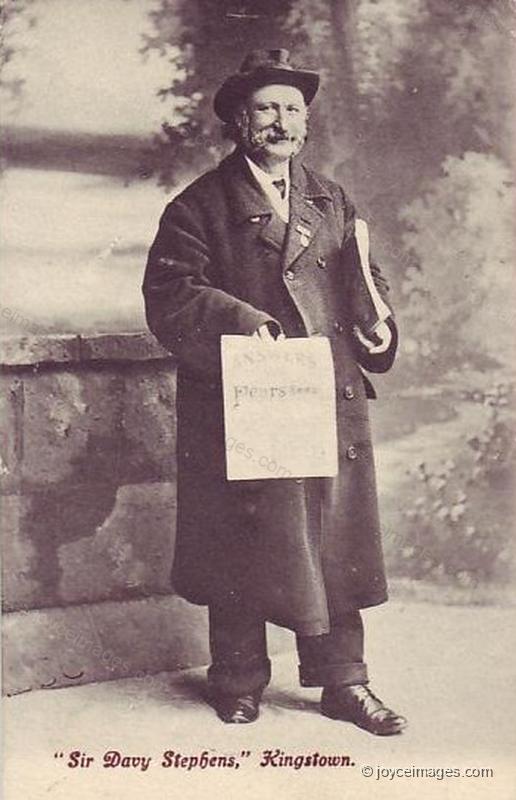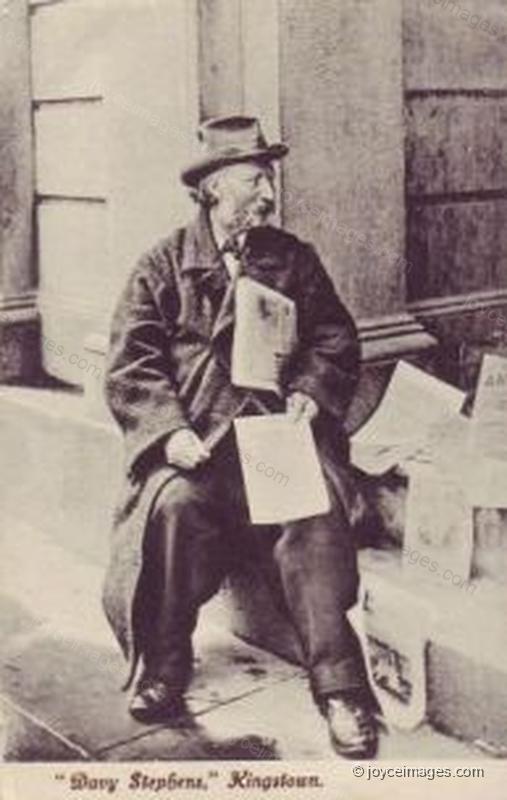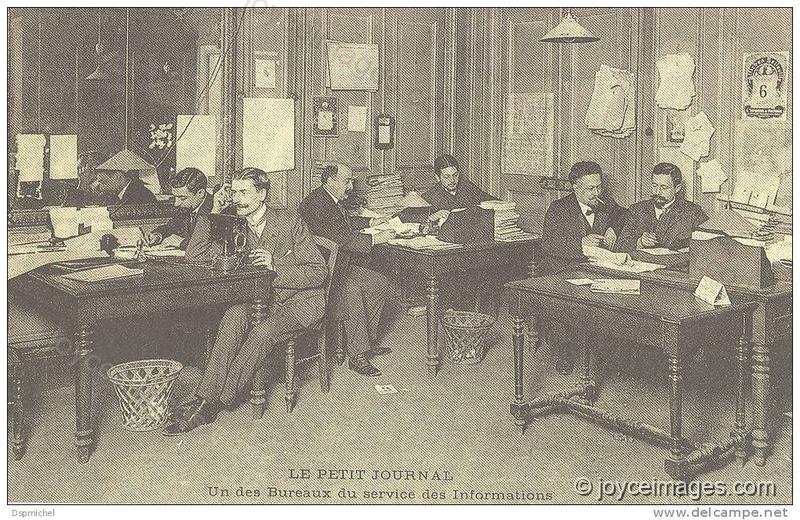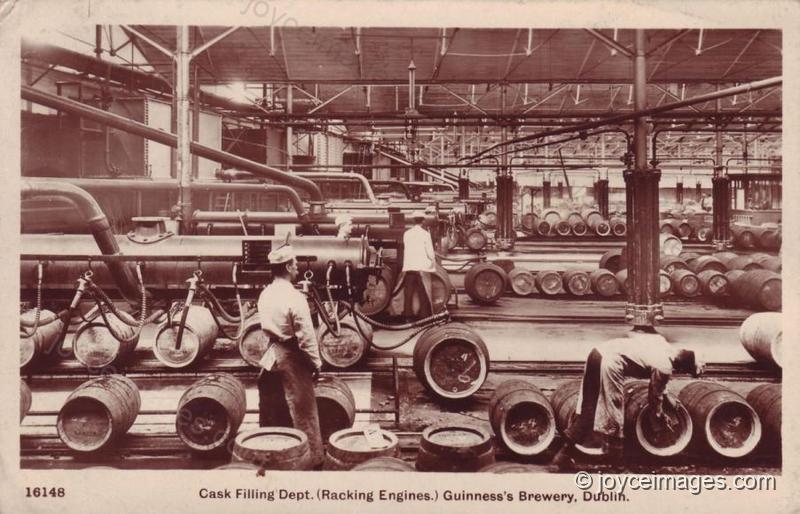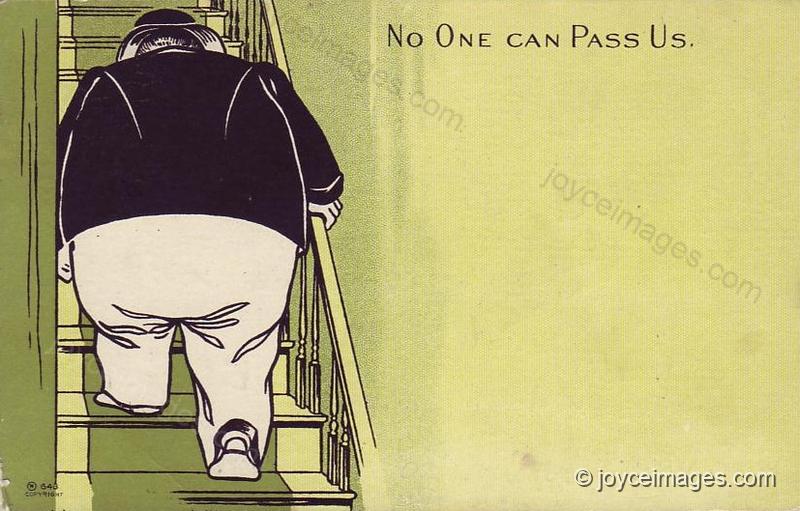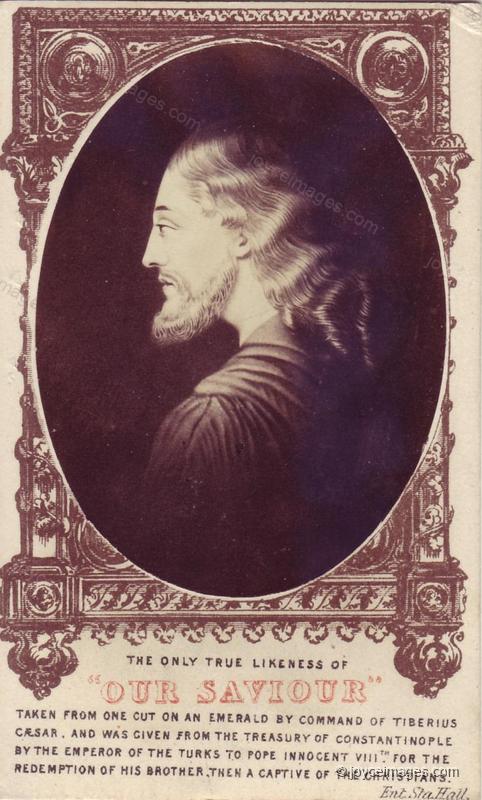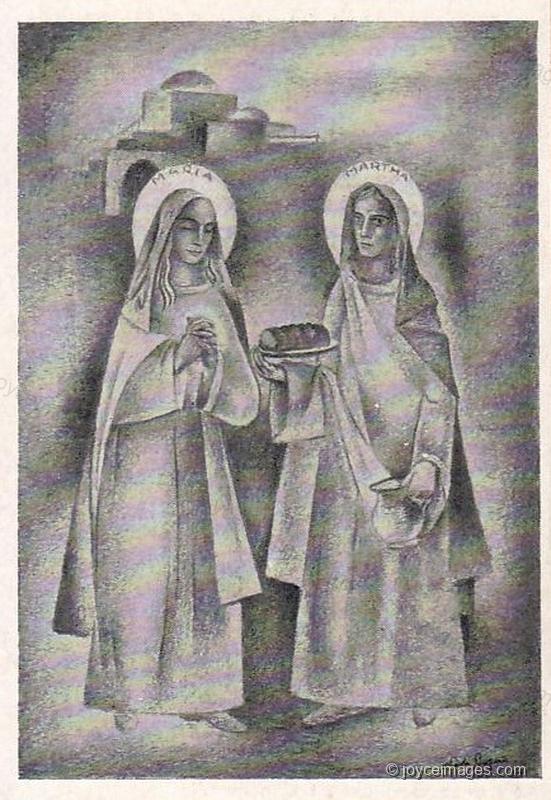From 'Dublin' (SOF, 1907): "The GPO building, of 3 stories, the lowest rusticated, is of mountain granite. The frontage is 223 feet. The magnificent portico, 80 feet in width, consists of 6 fluted ionic columns, each 4 feet 6 inches in diameter. These support an entablature with a richly carved frieze and a pediment, the tympanum of which bears the Royal Arms. Surmounting the pediment are statues, by John Smyth, of Mercury with the caduceus and purse; Fidelity finger on lip and bearing a key, and in the centre Hibernia with shield and spear. The cornice, 50 feet above ground-level, supports a handsome balustrade. From the court-yard of this building the mail-coaches once spead nightly, north and south, east and west; the English mail leaving at 7am by cart for Howth, whence the steam packets, or, in stress of weather, wherries, took it to Holyhead." This PC shows a popular Dublin joke, at the expense of British 'tourists,' about the statues atop the GPO.
In 1916 Padraig Pearse and James Connolly, leaders of the Easter Rising, proclaimed an Irish republic from the steps of the GPO. In the ensuing siege, the republicans sheltered and fought from within the building. A fire broke out, destroying most of the interior, and the GPO remained closed for renovations until 1929.
"Parked in North Prince's street His Majesty's vermilion mailcars, bearing on their sides the royal initials, E.R., received loudly flung sacks of letters, postcards, lettercards, parcels, insured and paid," (U7.16)
"GENTLEMEN OF THE PRESS" (U6.20)
A period advertisement for the 4 newspapers published by the same office. Bloom is a canvasser for The Freeman's Journal; Myles Crawford is seen handling the March 17 copy of The Weekly Freeman; the report of Dignam's funeral, that Bloom reads in Eumaeus, appears in The Evening Telegraph; and Lenehan writes for Sport.
A period advertisement for the 4 newspapers published by the same office. Bloom is a canvasser for The Freeman's Journal; Myles Crawford is seen handling the March 17 copy of The Weekly Freeman; the report of Dignam's funeral, that Bloom reads in Eumaeus, appears in The Evening Telegraph; and Lenehan writes for Sport.
"Grossbooted draymen rolled barrels dullthudding out of Prince's stores and bumped them up on the brewery float. On the brewery float bumped dullthudding barrels rolled by grossbooted draymen out of Prince's stores." (U7.21)
Guinness was sold and delivered to retailers in barrels. Retailers bottled the beer, and affixed to the bottles their own labels. Here the label for Extra Stout from John Mulligan's pub on Poolberg St, Dublin.
Guinness was sold and delivered to retailers in barrels. Retailers bottled the beer, and affixed to the bottles their own labels. Here the label for Extra Stout from John Mulligan's pub on Poolberg St, Dublin.
"- There it is, Red Murray said. Alexander Keyes.
- Just cut it out, will you? Mr Bloom said, and I'll take it round to the Telegraph office." (U7:25)
This PC shows the entrance to the newspaper offices on Prince street after the destruction of 1916. The names of the 4 journals are still visible.
- Just cut it out, will you? Mr Bloom said, and I'll take it round to the Telegraph office." (U7:25)
This PC shows the entrance to the newspaper offices on Prince street after the destruction of 1916. The names of the 4 journals are still visible.
"The door of Ruttledge's office creaked again. Davy Stephens, minute in a large capecoat, a small felt hat crowning his ringlets, passed out with a roll of papers under his cape, a king's courier." (U7.28)
Davy Stephens was, for more than 50 years, a 'newsagent' in Kingstown, a busy location because of the mailboats and railway station; he left only to attend the Epsom Derby every year.
Davy Stephens was, for more than 50 years, a 'newsagent' in Kingstown, a busy location because of the mailboats and railway station; he left only to attend the Epsom Derby every year.
A colorful character, Davy wrote an autobiography titled 'The Life and Times of Davy Stephens: the renowned Kingstown Newsman' where he describes himself thus: "His exterior is peculiar but prepossessing. Standing a little below the usual height for the proverbial Irishman, this point is quickly lost sight of in a deep well of wit, not yet completely sounded, beaming forth in his eyes. No one can say whether it is in the merry glance of his eye or in the quick repartee that issues from his lips, never for a moment sealed, that Davy's fortune lies. The corners of his mouth are turned up in a perpetual smile which his clean shaven chin tends to emphasise. [...] His hair hangs down over his shoulders in long strings, reminding one of that of Ulysses when tossed by the sea at the feet of the charming Nausicaa, and the fresh breezes of the Channel has reduced his complexion to a compromise between red and brown. In a black frieze overcoat and a soft Trilby hat he braves the cross-Channel gales in winter as readily as be broils beneath the portico of the railway station when the temperature is only 88 degrees in the shade. Atmospheric variations seemingly exert no influence on the perfect constitution of Davy. The scent of the briny and the glint of the sunshine are alike to him. Add to these particulars a fine rich brogue and the man is complete."
"Red Murray's long shears sliced out the advertisement from the newspaper in four clean strokes. Scissors and paste.
- I'll go through the printing works, Mr Bloom said, taking the cut square.
- Of course, if he wants a par, Red Murray said earnestly, a pen behind his ear, we can do him one.
- Right, Mr Bloom said with a nod. I'll rub that in.
We." (U7.31)
- I'll go through the printing works, Mr Bloom said, taking the cut square.
- Of course, if he wants a par, Red Murray said earnestly, a pen behind his ear, we can do him one.
- Right, Mr Bloom said with a nod. I'll rub that in.
We." (U7.31)
"WILLIAM BRAYDEN, ESQUIRE, OF OAKLANDS, SANDYMOUNT
Red Murray touched Mr Bloom's arm with the shears and whispered:
- Brayden.
Mr Bloom turned and saw the liveried porter raise his lettered cap as a stately figure entered between the newsboards of the Weekly Freeman and National Press and the Freeman's Journal and National Press. Dullthudding Guinness's barrels." (U7.42)
Red Murray touched Mr Bloom's arm with the shears and whispered:
- Brayden.
Mr Bloom turned and saw the liveried porter raise his lettered cap as a stately figure entered between the newsboards of the Weekly Freeman and National Press and the Freeman's Journal and National Press. Dullthudding Guinness's barrels." (U7.42)
"It passed stately up the staircase, steered by an umbrella, a solemn beardframed face. The broadcloth back ascended each step: back. All his brains are in the nape of his neck, Simon Dedalus says. Welts of flesh behind on him. Fat folds of neck, fat, neck, fat, neck." (U7.45)
"- Don't you think his face is like Our Saviour? Red Murray whispered.
The door of Ruttledge's office whispered: ee: cree. They always build one door opposite another for the wind to. Way in. Way out.
Our Saviour: beardframed oval face: talking in the dusk." (U7.49)
The door of Ruttledge's office whispered: ee: cree. They always build one door opposite another for the wind to. Way in. Way out.
Our Saviour: beardframed oval face: talking in the dusk." (U7.49)
